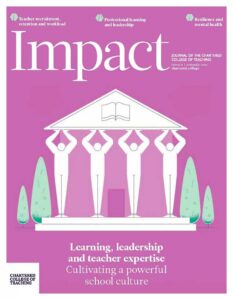The Department for Education (DfE) has taken steps over recent years to emphasise the importance of addressing excessive teacher workload, in order to reduce the number of teachers leaving the profession and to encourage more entrants to teaching. Advice has been published for providers and practitioners, such as ‘Addressing teacher workload in initial teacher education’ (DfE, 2018a), ‘Reducing workload: Supporting teachers in the early stages of their career’ (DfE, 2019a) and the ‘top tips’ offered in ‘Ways to reduce workload in your school(s)’ (DfE, 2019b). Toolkits for reducing teacher workload have been published, with examples from small-scale research studies in twelve settings (DfE, 2019c). The guidance is aimed at encouraging institutional and cultural change, which is vital in developing a mentally healthy workforce whose members can engage all children and young people in learning. However, if this is to become a reality, the workforce has to be central to
Join us or sign in now to view the rest of this page
You're viewing this site as a guest, which only allows you to view a limited amount of content.
To view this page and get access to all our resources, join the Chartered College of Teaching (it's free for trainee teachers and half price for ECTs) or log in if you're already a member.











